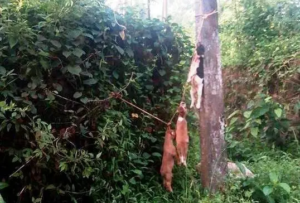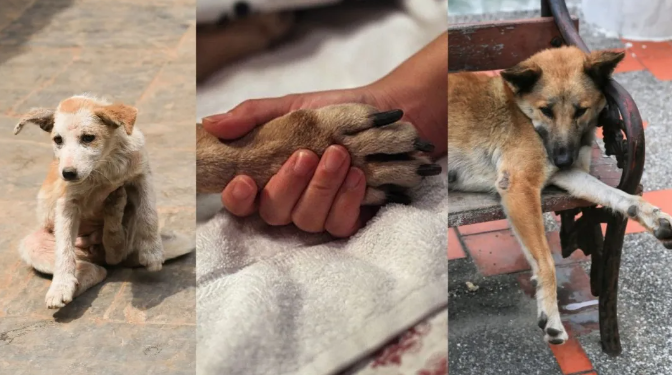The Kerala High Court recently stated that it is the responsibility of the state government to protect its people from dog attacks. Officials must identify and contain such canines and remove them from public places. That said, the bench of Justices A K Jayasankaran Nambiar and Gopinath P rightfully pointed out that nobody had the right to inflict unnecessary harm on dogs.

Recently, there were many incidents of illegal killing of community dogs. It doesn’t come as a huge surprise. Kerala has often been criticised for its lack of empathy for animals, especially street dogs. This article aims not to come to a conclusion but merely to encourage all to do what is right. The severe animal abuse cases in Kerala have been on the rising trend since 2014..
Also read: Some Lesser Known Indian Dog Breeds
What Is Animal Abuse, and Why Is This Article Important Now?
Animal abuse can be defined as cruelty to animals, neglect towards them, mistreating them either for personal benefit or due to an inherent prejudice. India is not a new player in cases of animal abuse. The weak laws against animal abuse being one of the main reasons. The lack of implementation and execution of these laws enable people to take “matters” into their own hands and deal with animals as they see fit. The street dogs, unfortunately, bear the brunt of this abuse.
Here is a brief outline of the timeline of the various dog abuse cases that have emerged in Kerala in the past few years:
September 2015 – Carcasses of dogs were found hanging from poles in Kannur to mark the death anniversary of Kathiroor Manoj. He was an RSS Worker in Kannur who was accused of a murder attempt on P. Jayarajan who was the CPM Kannur district secretary. Further encouraged by the panchayat, the dog catchers poisoned more than 40 dogs.
November 2016 – Jose Maveli carries an Airgun around for ‘self-defence’ and is popularly called Kerala’s “dog killer”. Charged with more than 7 cases of cruelty and alleged with many more, he is behind the campaign that asks people to kill street dogs to protect themselves.
October 2017 – More than 120 dogs were killed in the districts of Ernakulam and Palakkad, including lactating dogs, and puppies. Similarly, there was an incident where a bunch of people barged into a person’s house to kill a sheltered pup. She woke up to the horrific mutilated carcase of her puppy.
April 2018 – Following the death of a 65-year-old woman who was attacked by a pack of street dogs, angry workers culled stray dogs and tied their carcasses to sticks. They then paraded them through the streets shouting slogans against Menaka Gandhi and the state government for not being able to control the ‘menace’ of street dogs.
August 2019 – Manjeri Municipality in Malappuram was responsible for the death of hammering up to 15 dogs and dumping them into vehicles. A video showing their carcasses in the cars caused an FIR to be registered against them by the Humane Society International India, claiming that the dogs were sterilised and even vaccinated.
June 2020 – A dog chained with its mouth sealed with insulation tape was rescued in Thrissur. It was found in a pathetic condition, malnourished, and subjected to this barbaric treatment for over 2 weeks.
July 2021 – A dog was hung to death and beaten by 3 minors in Adimalathura beach, Thiruvananthapuram. The reason? After multiple warnings, the dog continued to sleep and rest under their boat.
These are just a few major incidents of dog abuse in Kerala. There are many more that might come to your mind as you read this, and yet more that go unreported.
Why Are Street Dogs Targetted?
According to the First Post, in 2018, an average of four people lose their lives every four months due to street dog attacks. 701 others, including over 100 children, got injured in canine attacks during the average 4 months, and over 53,000 people were treated for dog bites in Kerala. As many as 88172 suffered dog bites in 2013, 119119 in 2014 and 47156 in 2015 in the State, the figures added. Though this report is from 2018, the numbers since then have remained more or less the same.
So violence attributed to strays is one reason. I dug a little deeper and found a few more reasons why dog abuse in Kerala is prominent.
Misinformation about Rabies
People know half baked information about rabies – that it is an infectious disease that spreads by the bite of an infected dog. They then believe most/all street dogs have rabies. The lesser-known and most pertinent information in this case includes
99% of the dogs who have rabies die within 10 days. Only if bitten within this span of time are you at risk.
Dogs given the anti-rabies vaccine do not get rabies. The vaccine remains active for 3 years in adult dogs.
Rabies is also found in wild animals like foxes and bats.
But the misinformation that all dogs have rabies and the best way to stop the spread of rabies is culling dogs has been generated by mass hate and fear persisting amongst people. The most effective way, however, is to quarantine a suspected dog with the help of a municipality. But the misinformation that all street dogs have rabies has resulted in indiscriminate culling of even vaccinated dogs.
Lack of Animal-friendly Laws
The fine for killing a street dog is only ₹50. And in regards to pets, the fine and the years in jail can range from two-five depending upon the ‘cost’ of the pet. One cannot expect people to fear or abide by the laws if they keep a paltry sum of ₹50 as a fine.
Dangling of Financial Incentives
There have been various other instances where the State has offered to pay up to ₹500 for every culled dog. An alumni association of a prominent college announced gold coins as an incentive to civic authorities for killing the maximum number of street dogs. This sparked people’s greed and caused an indiscriminate killing of dogs.
Lack of a Strong Association like PETA Kerala and Funding for NGOs
Groups like Humane Society International India, which conducts vaccination and sterilisation of street dogs struggle due to a lack of volunteers. There are other NGOs who try to improve conditions but do not get sufficient funding. The Kerala State Animal Welfare Board (KAWB) is also active in filing complaints, but the number of volunteers has decreased over the years.
Inability to Foster Compassion to Animals Outside One’s Home
It’s shocking to know that some people promoting the elimination of dogs by culling, beating or poisoning them are themselves, pet owners. This is a form of selective compassion that plays a part too.
Also read: Funny Dog Stories That Will Brighten Your Day
The urge to kill street dogs without justification has extended from those in power to the common public enabled by media news, and mainstream ‘comedy channels’. Marimayam Episode 200 – Who is the street king? is an example. The episode has the main characters mocking a group of animal welfare people who try to register a case of animal abuse. The episode ends with an “intellectual discussion” that humans deserve to live, and if an elephant doesn’t face court charges for trampling a human, why should a human for killing a dog?
https://youtube.com/watch?v=u_nbMVxfLOs%3Fversion%3D3%26rel%3D1%26showsearch%3D0%26showinfo%3D1%26iv_load_policy%3D1%26fs%3D1%26hl%3Den-US%26autohide%3D2%26wmode%3Dtransparent
The aim is to show that “All lives are equal”. This information is widely unsettling and, to some extent, even influences people to kill street dogs. In a similar episode on street dogs menace, one of the lead characters coolly says (translated from Malayalam), “Why worry about street dogs? You can just mix some glass pieces or poison in rice and feed it.” This is followed by laughter. The satirical portrayal of important matters by such serials normalises it. Further, they drag in names of political figures like Menaka Gandhi, muddling the argument.
Also read: Animals in Malayalam Cinema: Dogs
Is There an Alternative to Culling?
Proponents of culling of strays justify the act by stating the reasons like:
Life threatening attack on humans
Spread of rabies
Their unhygienic conduct makes people uncomfortable
We must understand that, just as human beings live in a society, humans are part of a larger ecosystem. Sociology includes the points of merging animal societies with human ones due to their interdependence. Though, the points mentioned above are valid and cause widespread hate and fear amongst people against street dogs, culling them is not the solution. Culling is nothing but murder of voiceless animals who trust us.

Here are some tested and effective ways to control the growing population of street dogs. Many of these methods have been implemented in other streets and are being practised by private organisations within Kerala.
Implementation of the ABC Programme
As defined by various portals, “Animal Birth Control program (ABC). The ABC programme aims to reduce stray dog population density and decrease mating/ maternal/pack aggression in stray dogs. The program involves capturing, neutering, and releasing stray dogs based on a Standard Operating Procedure (SOP) for animal birth control programs outlined by the Animal Welfare Board of India (AWBI).” Implementation of this programme in Kerala will definitely reduce the number of street dogs.
Stray Dog Zoos/Shelters
When implemented in the proper sense, stray dog zoos can be considered elaborate shelters for the prevention of dog abuse in Kerala. According to The Hindu (July 2017), “The Kerala government is planning “stray dog zoos” to keep them off the streets in the State. The State government informed a Supreme Court Bench led by Justice Dipak Misra that it had asked all district panchayats to keep aside two to three acres and notify them as ‘stray dog zoos’.” It was rebutted strongly by activists and KABW due to its vague nature and lack of execution ideas. Though in retrospect, one can see that it is definitely a better idea than mass culling dogs. These dogs can then be rehabilitated and adopted.
Effective Waste Management
Lack of effective waste management is one of the main reasons for an increased street dog menace in Kerala. The dogs come out after dark searching for food amongst these garbage piles and tend to attack those passing by due to the fear of losing food or feeling threatened. Disposal of waste with sanitation will reduce the street dog population, and avoid diseases like rabies as mice aren’t given breeding grounds.
Supporting Animal Welfare Groups
Supporting welfare organisations like Humane Society International India will ensure that street dogs are vaccinated and neutered. Vaccination will ensure rabies is curbed and neutering (sterilisation) will impede their breeding, reducing the population. One can support such organisations with funds and contributions, spreading the word about their mission, or in-person as volunteers. This is one of the effective ways to prevent dog abuse in Kerala.
Feeding Street Dogs or Adopting Them
There have been many cases where a pack of street dogs has attacked people to grab food packets. Understanding that dogs can be hungry and have basic needs like other living beings will invoke compassion within us. Feeding them a couple of biscuits or leftovers will guarantee that the dogs don’t go hungry and thus, reduce the chances of an attack. You can also choose to adopt a street dog instead of shopping for a pet, thereby keeping them off the street.
Also read: Why You Should Choose Pet Adoption: Puppy Mills And ‘Aesthetics’
A dog is called a man’s best friend. And the Earth definitely belongs to all species, including human beings. Animal abuse is regressive and causes us to lose the humanity we preach.
